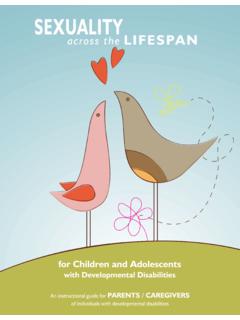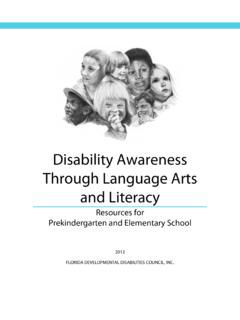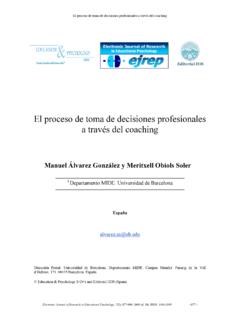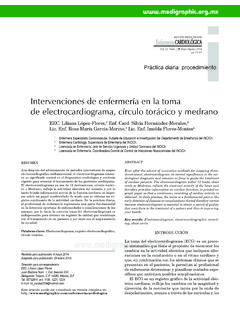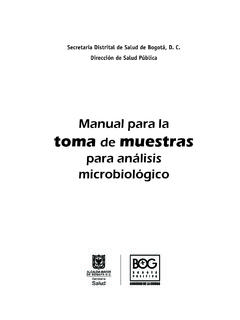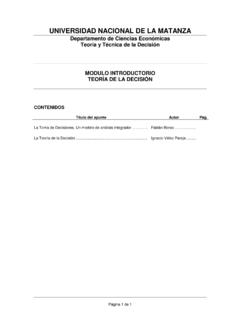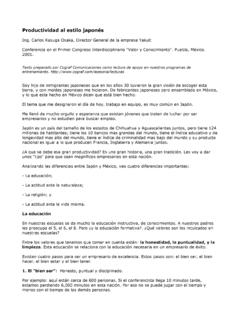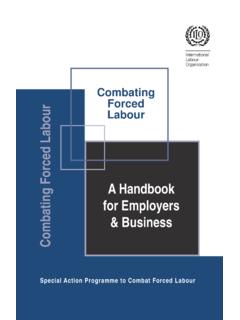Transcription of A Manual for Individuals and Families - FDDC
1 Lighting the Way to guardianship and other decision - making Alternatives:A Manual for Individuals and FamiliesPartnersAgency for Persons with DisabilitiesGuardian Pooled TrustOffice of Public Guardian, Public guardianship OfficeFlorida Developmental Disabilities Council, document was commissioned, funded and sponsored by the Florida Developmental Disabilities Council, Inc., and produced through funding provided by the Department of Health and Human Services, Administration for Developmental the Way to guardianship and other decision - making AlternativesCopyright 2010 Florida Developmental Disabilities Council, Manual for Individuals and FamiliesThis Manual is designed to provide accurate and timely information in regard to the subject matter covered. Its use by the intended audience is for educational purposes and should be used with the understanding that no legal advice is intended, implied or provided.
2 If legal advice or other expert assistance is required, the services of a competent professional should be 03/10ivLighting the Way to guardianship and other decision - making AlternativesvA Manual for Individuals and FamiliesAcknowledgementsSpecial appreciation is expressed to the following contributors that have made this project possible:Phoebe Ball, Esq. Self-Determination Issue TeamAdvocacy Center for Persons with Disabilities, , FloridaRebecca Berg, and AssociatesJacksonville, FloridaEd Boyer, & Jackson, , FloridaKen Brummel-Smith, Edwards Maguire Professor and ChairDepartment of GeriatricsFlorida State University College of MedicineTallahassee, FloridaKaren Campbell, DirectorOffice of Public Guardian, , FloridaMelinda CoulterClient Legal Rights ChampionAgency for Persons with DisabilitiesTallahassee, Florida Susan DunbarParent-AdvocateTallahassee, FloridaTravis D.
3 Finchum Co-Trustee Guardian Pooled TrustKarol, Hausman, Sosnik & Finchum, LLPC learwater, FloridaLeo GovoniThe Center for Special Needs Trust Administration, , FloridaGerald (Jay) Hemness, DirectorCenter for Guardian AdvocacyBrandon, FloridaMichelle Hollister, Legal, Beach, FloridaMary Alice Jackson, & Jackson, , FloridaSara RomineSelf-AdvocateLakeland, FloridaJohn Sample, SPHRP rincipalSample & AssociatesTallahassee, FloridaVicki SimmonsEvent CoordinatorTallahassee, FloridaScott Solkoff, & Associates, Beach, FloridaJeffrey Spike, of Medicine Humanities and Social SciencesCollege of MedicineFlorida State UniversityTallahassee, FloridaMarc Tasse, Director Florida Center for Inclusive Communities UCEDDU niversity of South FloridaTampa, FloridaLauchlin Waldoch, Law Group, , FloridaEddie YonPresident and FounderElyon Technologies.
4 FloridaviLighting the Way to guardianship and other decision - making AlternativesSpecial ContributorsFlorida Developmental Disabilities Council, Inc., the Community Living and Service Coordination Task Force, and Latarsha Williams, the CL/SC Program Manager, for their ongoing support of this Jacques for his assistance with the design and graphic layout of this Manual for Individuals and FamiliesTable of ContentsIntroduction ..ixSection 1 Fundamental Concepts ..1 Civil Rights ..3 Self-Determination ..5 Principles Underlying decision - making ..7 Special Issues ..13 Section 2 Options for Providing decision - making Assistance other Than guardianship ..17 Option 1 Make My Own Decisions ..20 Option 2 Banking Services ..21 Option 3 Power of Attorney (POA) and Durable Power of Attorney (DPOA).
5 21 Option 4 Representative Payee ..23 Option 5 Advance Directives ..23 Option 6 Medical Proxy ..24 Option 7 Trusts ..24 Section 3 Guardian Advocacy and guardianship ..33 Guardian Advocacy ..35 guardianship ..36 Guardian of Person and Guardian of Property ..38 Reports Required by the Court ..40 Types of Guardians ..42 Guardian Responsibilities ..44 Types of Guardianships ..45 Restoration of Rights ..47 Successor Guardian ..49 Termination of guardianship ..49 Comparison of Guardian Advocacy and guardianship Chart ..51viiiLighting the Way to guardianship and other decision - making AlternativesSection 4 Legal Resources ..55 Barriers to Accessing Legal Services ..57 How to Prepare for a Meeting with an Attorney ..59 Additional Legal Resources ..62 Glossary of Key Terms ..67 Appendix.
6 77 Civil Rights Chart ..79 Educational Resources ..80 Five Wishes ..82 Medical Proxy and Declaration of Medical Proxy Form ..83 Actions of Guardians/Guardian Advocates ..86 References ..89ixA Manual for Individuals and FamiliesIntroductionThe Florida Developmental Disabilities Council, Inc., (FDDC), recognizes that making legal decisions with and for Individuals with developmental disabilities can be challenging. Individuals and Families are often intimidated by Florida s legal system. In addition, Florida faces a shortage of attorneys and other qualified legal professionals that are knowledgeable about legal issues relating to people with disabilities and their Families . The Council believes it is important for Individuals with disabilities to have information that will empower them to manage all aspects of their daily affairs to the best of their primary purpose of this Manual is to increase the knowledge of Individuals with disabilities and their Families about the various ways under Florida law to provide decision - making assistance, including guardian advocacy and guardianship .
7 How to access the legal system, when necessary, is also addressed in the Manual . A companion Manual for attorneys and other qualified legal professionals was also created and is available to assist the legal community. Experts in the various subject areas developed the content of this Manual using a rigorous process that included an assessment of the needs of self-advocates, Families and attorneys and the development of specific training objectives. Reference materials were gathered and are cited throughout this Manual with an appendix of additional resources. The Florida Developmental Disabilities Council s Planning Ahead Guide, Chapter 8, is a cornerstone of the subject matter contained in this Manual . Please note that the content of the Manual is current as of March 2010; however, the additional reference materials and resources may not be current or include recent changes in the law.
8 You will also find that words or phrases in bold are defined in the Manual is intended to be an overview of guardian advocacy and guardianship , and other decision - making options available under Florida the Way to guardianship and other decision - making Alternatives1A Manual for Individuals and FamiliesSection 1 Fundamental Concepts2 Lighting the Way to guardianship and other decision - making AlternativesCivil Rights ChartCivil Rights (alphabetically)Can NEVER be taken away from The PersonCommit a Person to a facility, institution or licensed service provider without formal placement proceedingContractCounsel (an Attorney), To be represented byXCourt Access, To haveXDissolution of Marriage, Petition toDriver's License, To apply forEducation, To receive a properXEmployment, Seek or retainExperimental Biomedical or Behavioral Procedures or Experiments, Consent to participate inFreedom from Abuse, Neglect and ExploitationXGovernmental Services, Apply forHumanely Treated with dignity and respectXIndependence, To remain as independent as possibleXLawsuits, Sue and defendLiving Arrangements, Right to decide MarryMedical, Dental, Surgical and Mental Health Treatment, Consent toMoney and Property, ManageParental Rights, Consent to termination ofRehabilitation and Services, To receive necessaryXSocial Aspects of Life, Consent toSterilization or Abortion.
9 Consent toTravelVote3A Manual for Individuals and FamiliesCivil RightsIn the United States, a civil right is a right that is protected by either federal or state law. Civil rights spell out fundamental freedoms and privileges including due process and freedom from discrimination. Courts directly impact how these laws are interpreted. Everyone eighteen years of age or older has the same civil rights and no one can legally take these away unless the person is provided due process. The chart on the previous page identifies an individual s civil rights and those rights that can never be taken away. For most people, the most familiar civil right is the right to be represented by an attorney in criminal proceedings. For example, if you are accused of committing a crime, and cannot afford an attorney, the court will appoint one for you.
10 Similarly, if someone tries to take a civil right away from you in court, you may have the right to be represented by a court-appointed attorney. Under some circumstances, a person can let someone else act for himself or herself. For example, you can give someone the right to apply for government services and benefits or you can give someone the right to make medical decisions for you. Under other circumstances, a person s rights can be partially or completely removed by a court and given to someone the court chooses, like a guardian or guardian someone is 18 or older, a social worker, support coordinator, service provider, or even parents lack the legal authority to remove civil rights or make another person s decisions. Only a court can do that!

